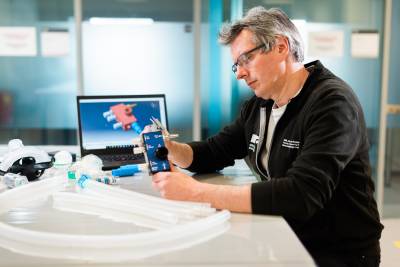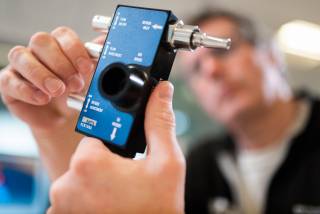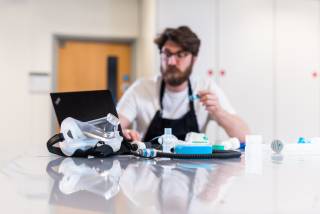This breathing aid was produced within a rapid timeframe – it took fewer than 100 hours from the initial meeting to production of the first device.
Engineers at UCL and Mercedes AMG High Performance Powertrains (Formula 1) came together to reverse engineer an existing off-patent CPAP system to meet the demands created by the Covid19 pandemic emergency. The breathing aid they produced is a Continuous Positive Airway Pressure (CPAP) device. The CPAP supports patients with breathing difficulties.

Professor Tim Baker (UCL Mechanical Engineering) developing the CPAP prototype at MechSpace
The CPAP works by pushing an air-oxygen mix into the mouth and nose at a continuous pressure, keeping airways open and increasing the amount of oxygen entering the blood stream. This breathing aid can be used to help Covid-19 patients with serious respiratory problems to breathe more easily and has been shown to help prevent the need for invasive ventilation.
Engineers worked around the clock at UCL's engineering hub MechSpace to produce the CPAP as quickly as possible, creating the first prototype within just 100 hours and moving to regulatory approval of the device in 10 days. They have since worked to optimise the device further, producing a modified version Mark II which has been shown to reduce oxygen consumption in healthy volunteer assessments by up to 70%.
The team of mechanical engineers working on the device included UCL postgraduates, staff and even some alumni who returned to support. A blog detailing the experience of these alumni on the project can be read here. The strong links between UCL Engineering and Formula 1 Motorsports were vital in enabling this collaboration to happen at the speed which it did.
Professor Tim Baker (UCL Mechanical Engineering) said: “Given the urgent need, we are thankful that we were able to reduce a process that could take years down to a matter of days.
“From being given the brief, we worked all hours of the day, disassembling and analysing an off-patent device. Using computer simulations, we improved the device further to create a state-of-the-art version suited to mass production.
“We were privileged to be able to call on the capability of Formula One – a collaboration made possible by the close links between UCL Mechanical Engineering and HPP.”
The Mercedes AMG High Performance Powertrains team are now rapidly manufatcturing the devices to meet an order from the UK government of up to 10,000 for NHS hospitals by 15 April.
Currently, 40 machines that would normally produce F1 pistons and turbochargers are being used for production of the CPAP devices, and the entire HPP technology centre in Brixworth, Northamptonshire has been repurposed to meet this demand.
Read the 'inside story' of how engineers fast-tracked the device in The Conversation, told by UCL Engineering colleague Prof Clare Elwell.
 Close
Close



